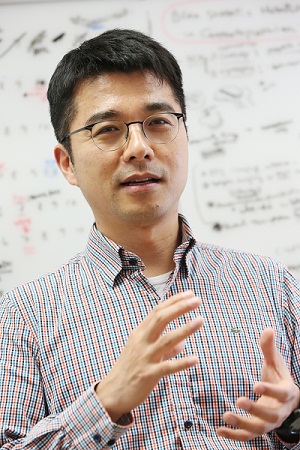people
The award identifies leading scientists worldwide and funds their cutting-edge research in epilepsy.
The Citizen United for Research in Epilepsy (CURE) announced on September 7, 2015, that Jeong Ho Lee, a professor of the Graduate School of Medical Science and Engineering at KAIST, will be awarded the 2015 Pediatric Epilepsies Research Award.
The Pediatric Epilepsies Research Award is given annually to a researcher who has conducted novel, innovative research projects that address severe, intractable pediatric epilepsies as well as collaborative, interdisciplinary projects that explore new approaches to find a treatment for pediatric epilepsies.
Lee was recognized for his leading study in the field of intractable epilepsy. He is the first Korean who has ever received this award, securing a research grant of USD 250,000 for two years.
Lee has conducted research on brain somatic mutations as the novel cause of childhood intractable epilepsy. Pediatric epilepsies account for approximately 70% of all cases of epilepsy.
Established in 1998, CURE is a non-profit American organization based in Chicago, Illinois, which is committed to funding research and various initiatives that will lead to breakthroughs to cure epilepsy.
Since its inception, CURE has been at the forefront of epilepsy research, raising more than USD 32 million to support researchers and scientists worldwide. It has also awarded more than 180 cutting-edge projects in 13 countries.

-
research Genetic Cause of ADHD (Attention Deficit Hyperactivity Disorder) Found
The cooperative research team consisting research teams under Professor Kim Eun Joon and Professor Kang Chang Won of the department of Biological Sciences discovered that ADHD arises from the deficiency of GIT1 protein in the brain’s neural synapses. ADHD (Attention Deficit Hyperactivity Disorder) is found in around 5% of children around the world and is a disorder where the child becomes unable to concentrate, show over the top responses, and display impulsive behavior. The r
2011-04-30 -
research Success in differentiating Functional Vascular Progenitor Cells (VPC)
KAIST’s Professor Han Yong Man successfully differentiated vascular progenitor cells from human embryonic stem cells and reversed differentiated stem cells. The research went beyond the current method of synthesis of embryonic body or mice cell ball culture and used the careful alteration of signal transmission system of the human embryonic stem cells to differentiate the formation of vascular progenitor cells. The team controlled the MEK/ERK and BMP signal transmission system
2011-01-18